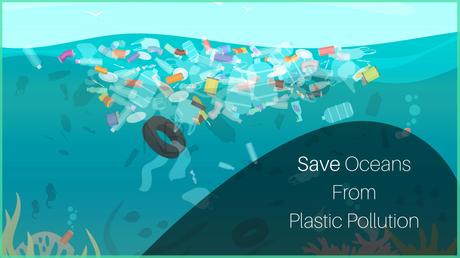
Oceans are a fundamental entity for life on Earth. They cover about 71% of the planet's surface and contain 97% of the Earth's water. They are home to countless species and ecosystems that we rely on for climate regulation, livelihoods, and most importantly, food.
With all its might, our oceans are slowly dying.As of today, plastic bags, plastic bottles, and micro-plastics are choking the sea life and clogging down our marine ecosystems. The oceans need our help. Saving them may feel like an overwhelming task, but if together we all take a stand, our little steps will build up over time and make a big difference for our future generations.
How our oceans are getting polluted?
Globally, one of the most serious threats to oceans is plastic pollution. With an exponential increase in plastic production, low levels of recycling, and poor waste management, around 4-12 million tons of plastic ends up in our oceans each year. And that amount is expected to rise more than double in the next decade!
Plastic has been found in roughly 84% of safe drinking water worldwide, as far as the arctic and even in the extreme corners of the Mariana Trench! Quite astounding, isn't it? There have even been cases of raining micro-plastics, microplastics have also been found in sea salt, plastic is everywhere. And since plastic doesn't biodegrade, it never goes away; plastics are forever. Instead, plastic debris breaks down into tinier-particles, known as micro-plastics; their environmental impacts are still being determined.
So now, the question remains, what steps can you take to reduce the pollution of plastic in the ocean? Here are eight lifestyle choices that, if adopted, can help protect and restore our oceans for the generations to come.
8 ways you can contribute reducing plastic pollution in oceans
It's time to join the global movement by reducing your own plastic use. Here are eight ways you can make a difference:
1. Reduce use of single-use plastics
It does not matter where you reside, the easiest and most direct way you can begin is by reducing your consumption of single-use plastics. It includes plastic straws, bags, water bottles, utensils, cups, takeout food containers, and any other plastic items which are discarded after using once.
The best way to do so -
- Refuse from using any single-use plastics that you do not need (e.g., takeout food containers, plastic bags, utensils)
- Purchase and carry with you the reusable version of those products, such as reusable bottles, coffee cups, grocery bags, etc.
2. Avoid using products containing microbeads
In recent years, tiny plastic particles, called " microbeads," have become a growing source of concern for its contribution to ocean pollution. Generally, they are found in toothpaste, face scrubs, and body washes. Microbeads readily enter our oceans and waterways through our sewer systems and affect marine life.
For instance, tiny pieces of plastic waste are having a significant impact on lugworms on marine animals, which are an important food source for other animals. A recent study has found approximately 73 percent of fish caught at mid-ocean depths in the Northwest Atlantic had microplastic inside their stomachs,
Try to avoid products containing plastic microbeads by observing their ingredient label on your cosmetic products, look for products which do not have "polyethylene" and "polypropylene". Here is a list of products containing microbeads.
3. Microfibers
Many are not aware of this, but microfibers constitute a significant source of plastic pollution in the ocean. Roughly 60% of the clothing we wear consists of synthetic fibers. Every time a piece of synthetic clothing is washed, like polyester, acrylic, and fleece, plastic fibers from the clothing are shed into the waterways and the ocean.
There are a few solutions to fix the problem:
Use natural fibers more
Try to buy clothing made of natural fibers as they do not contain any synthetic fiber in their composition.
Here's a quick list of natural fibers you may consider:
Wash less!
When it comes to the subject of washing your clothes, try to prolong the length of time before you clean it again. This is a fantastic way to save water and keep your clothes lasting longer, reducing plastic pollution along the way.
The thing is, often you require a little number of synthetic fibers to mandating the integrity of a piece of clothing. It's also always best to take preventative measures by using something to catch microfibers. Consider purchasing a Guppy Friend wash bag; in tests which were carried out, the bag captured 99 percent of fibers released in the washing process.
Use washing liquid
Instead of washing powder, use washing liquid. Because the 'scrub' function of the grains powder ends up loosening the fibers of clothes more than the liquid, also, try to use fabric softeners as some of its ingredients reduce friction between fibers for which the release of fibers decreases.
Wash at low temperature
If the clothes are washed at high temperatures, some of the fabric can get damaged, leading to the release of microfiber.
4. Participate in a beach clean-up
Organize or participate in a local beach or waterway clean-up to prevent plastics from getting into the ocean in the first place. This is one of the most rewarding and direct ways to battle ocean plastic pollution. Go to a nearby beach or waterway and collect plastic waste with your family or friends, or you can join a local organization's clean-up and do the same.
5. Support ban on single-use plastic
A large number of municipalities around the world have enacted bans on single-use plastic bags, bottles, and takeout containers. What you can do is support the adoption of such policies in your community. Here is a list of resources for legislative bodies considering limiting the usage of plastic bags.
6. Support NGO's addressing plastic pollution
Many non-profit organizations are working to eliminate and reduce plastic pollution in the ocean in various ways, such as 5 Gyres, Algalita, Plastic Soup Foundation, and others. Most of these organizations rely on donations from people like you to continue their crucial work. The amount you donate does not matter, and even small ones can accumulate together can make a significant impact!
7. Spread the word
Stay up to date on issues related to plastic pollution and help spread awareness of this growing issue. Relay your knowledge to your friends and family about how they can be part of the solution moving forward. A great idea would be to host a viewing party on one of the several plastic pollutions based documentaries, like Garbage island, Bag it, or Addicted to Plastic.
8. Recycle
Lastly, when you use single-use and other plastics that can be recycled, always be sure to recycle them properly. At present, a whopping 91% of plastic isn't recycled worldwide, quite remarkable. The act of recycling helps keep plastics out of the ocean and reduces the quantity of "new" plastic circulation.
Here are some tips:
- Check for the recycling symbol on all the plastics that you buy, don't buy the product if there isn't one.
- If you are a company purchasing large-scaled plastic materials, check whether there is a commercial recycler who will buy your materials when you use of the plastic is finished.
- Look for a program in your stat that will recycle post-consumer soft plastic waste, such as plastic bags and bread wrappers into large-scale recycled products like bridges, etc.
Check out your local waste transfer stations in Melbourne to guarantee that the plastic waste is recycled adequately.
Measures taken by countries around the world
Here are some of the measures taken by some of the counties around the world to fight ocean plastic pollution.
- Australian Capital Territory (ACT) banned plastic bags on 1st November 2011; the ban applies to all retailers in the ACT for single-use plastic bags that are less than 35 microns in thickness.
- Kenya completely banned plastic bags in 2017, violation of the rule would lead to imprisonment and a fine of $40,000.
- France banned plastic cups, utensils, and plates in 2016; plastic bags have already banned much before that.
- In the USA, multiple cities, including Seattle and San Francisco, have banned single-use plastic. Washington DC and Boston have imposed taxes on plastic bags to dissuade people from using them.
- India has initiated a crackdown on plastic; it aims to limit the consumption of single-use plastic and eliminate it by 2022.
- Plastic bags were banned in New Zealand in 2018.
- Bangladesh became the first country to bag thinner plastic bags in 2002.
- Morocco announced a nationwide ban on the production of plastic bags in 2016.
Final words
In this article, we have presented you with eight possible ways to contribute to slowing down plastic pollution in the ocean. By following these steps, you can address the growing problem of plastic pollution and help heal our oceans.
The most important thing to remember, that if we all take small steps together in our battle against ocean plastic pollution, the oceans will gift us in many precious ways.

